“Free to Choose Liberty and Eternal Life”
2 Nephi 1–2
LDS manual: here
Purpose
To encourage readers to use agency
Reading
This reading is an exploration into Lehi’s discourse on agency. Agency — the ability to think and act — is a complex topic… that gets completely subverted by Lehi and the lesson manual. And that makes sense for the LDS Church.
It wants people who will work tirelessly… in ways that benefit the organisation.
It declares obedience “the first law of heaven”, but still wants you to be an agent… as long as you only use your agency to obey.
It wants you to investigate the truthfulness of the Church… as long as you decide that it’s true.
As my uncle Richard used to say in the BYU religion classes he taught, “God gave us agency to see if we’d give it right back.” Which is terribly Mormon, isn’t it?
And that’s why the centrepiece of the lesson — and its title — is a very one-sided view of agency.
2 Nephi 2:27 Wherefore, men are free according to the flesh; and all things are given them which are expedient unto man. And they are free to choose liberty and eternal life, through the great Mediator of all men, or to choose captivity and death, according to the captivity and power of the devil; for he seeketh that all men might be miserable like unto himself.
Got that? You can choose
- liberty and eternal life, or
- captivity and death.
Wow, when you put it that way, that really makes the choice clear! It’s almost like you’re asking me to choose between cake, or death.
Whoops, there’s a flag down on the play.
Yep, it’s a false dichotomy. The church would love to paint itself as the bringer of life and liberty — so that leaving the church is death — but in reality there are a lot of other choices. Life outside the church can be messy sometimes; choosing your own course can be messy sometimes. But it can also be good, moral, and fulfilling.
This is news to many of us who grew up in the church. We told each other over and over again that we didn’t know what we’d do without the church; we’d probably be in jail or dead. Many of us weren’t free. We were indoctrinated as children.
We were carefully led from program to program, from age bracket to age bracket, from Primary to Young Men/Women’s. Then to a mission — too many of us were getting away, so they lowered the age limit to prevent that first year of uni. Then we were encouraged to get married young, to someone we scarcely knew.
That’s because married people with kids are easy to control.
There we went, from bubble to bubble, from investment to investment, until the years of indoctrination had taken effect.
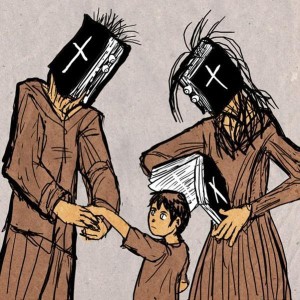
I want to say: They wanted to make us miserable like they were. But maybe that’s unfair. Were they unhappy? Some were. Some thought the church was just great. That was the thing: the church didn’t care if we were miserable or not, as long as we stayed in.
So are you free in the church? Yes, you’re free, but it’s the kind of free where you’re in the temple for the first time. There’s a bit where they tell you that if you want to go, you’re free to go without taking on all the promises and covenants. But they don’t tell you what the they are. There you are, ready to make an eternal commitment, but you don’t know what it is yet. The transparency and informed consent are severely lacking.
Thankfully, more and more of us are breaking free and learning to use our own agency for real.
There’s another idea introduced in this reading.
2 Nephi 1:20 And he hath said that: Inasmuch as ye shall keep my commandments ye shall prosper in the land; but inasmuch as ye will not keep my commandments ye shall be cut off from my presence.
Ask: What kind of parent abandons their children if they are disobedient?
Answer: A parent with conditional love.
Main ideas for this lesson
Empty continent
The Book of Mormon has a major problem, which I call “The Incredible Vanishing Lehites”. Lehi and his family are supposed to have come to the New World, proliferated to truly exponential levels, and built a huge civilisaton. Surely a group of this size would have left some evidence of their existence, either from archaeology, anthropology, linguistics, genetics, or any other way. Yet we never find anything.
The apologists’ answer is that the Lehite group was quickly subsumed into a large local population… that Nephi never mentions.
The reason Nephi never mentions running into anyone else is that the Book of Mormon holds that no one else was there on the continent. We’ll be coming back to this idea a few times during our study, but here’s the first indication.
2 Nephi 1:6 Wherefore, I, Lehi, prophesy according to the workings of the Spirit which is in me, that there shall none come into this land save they shall be brought by the hand of the Lord.
1:7 Wherefore, this land is consecrated unto him whom he shall bring. And if it so be that they shall serve him according to the commandments which he hath given, it shall be a land of liberty unto them; wherefore, they shall never be brought down into captivity; if so, it shall be because of iniquity; for if iniquity shall abound cursed shall be the land for their sakes, but unto the righteous it shall be blessed forever.
1:8 And behold, it is wisdom that this land should be kept as yet from the knowledge of other nations; for behold, many nations would overrun the land, that there would be no place for an inheritance.
1:9 Wherefore, I, Lehi, have obtained a promise, that inasmuch as those whom the Lord God shall bring out of the land of Jerusalem shall keep his commandments, they shall prosper upon the face of this land; and they shall be kept from all other nations, that they may possess this land unto themselves. And if it so be that they shall keep his commandments they shall be blessed upon the face of this land, and there shall be none to molest them, nor to take away the land of their inheritance; and they shall dwell safely forever.
This passage says:
- No one would come into the land unless God brought them
- Knowledge of the land was being withheld from others
- If people from Jerusalem who moved there were good, they’d prosper
- These people (from Jerusalem) would have the land all to themselves.
That’s really kind of it, isn’t it? No one else was there.
There may be some wiggle-room in the wording, language being what it is. I don’t think any passage in the Book of Mormon (or anywhere else) is so airtight that someone couldn’t wedge in a semantic crowbar and open a crack of ambiguity. But I think this passage makes it clear that whoever wrote the Book of Mormon wrote the American continent as a wilderness. I don’t think anyone could make the opposite case — that the place had a pre-existing population — because the Book of Mormon just never says anything to that effect.
Again, this is a huge problem for the Book of Mormon because there’s just no trace of these people.
Opposition in all things
Lehi offers this tidbit of wisdom:
2 Nephi 2:11 For it must needs be, that there is an opposition in all things. If not so, my first-born in the wilderness, righteousness could not be brought to pass, neither wickedness, neither holiness nor misery, neither good nor bad. Wherefore, all things must needs be a compound in one; wherefore, if it should be one body it must needs remain as dead, having no life neither death, nor corruption nor incorruption, happiness nor misery, neither sense nor insensibility.
Well, I guess that makes sense, kind of. Salty and sweet and all that.
But that’s not the intersting bit. What’s interesting is how the author ties it into a discussion about the existence of God.
2 Nephi 2:10 And because of the intercession for all, all men come unto God; wherefore, they stand in the presence of him to be judged of him according to the truth and holiness which is in him. Wherefore, the ends of the law which the Holy One hath given, unto the inflicting of the punishment which is affixed, which punishment that is affixed is in opposition to that of the happiness which is affixed, to answer the ends of the atonement —
2:11 For it must needs be, that there is an opposition in all things. If not so, my first-born in the wilderness, righteousness could not be brought to pass, neither wickedness, neither holiness nor misery, neither good nor bad. Wherefore, all things must needs be a compound in one; wherefore, if it should be one body it must needs remain as dead, having no life neither death, nor corruption nor incorruption, happiness nor misery, neither sense nor insensibility.
2:12 Wherefore, it must needs have been created for a thing of naught; wherefore there would have been no purpose in the end of its creation. Wherefore, this thing must needs destroy the wisdom of God and his eternal purposes, and also the power, and the mercy, and the justice of God.
2:13 And if ye shall say there is no law, ye shall also say there is no sin. If ye shall say there is no sin, ye shall also say there is no righteousness. And if there be no righteousness there be no happiness. And if there be no righteousness nor happiness there be no punishment nor misery. And if these things are not there is no God. And if there is no God we are not, neither the earth; for there could have been no creation of things, neither to act nor to be acted upon; wherefore, all things must have vanished away.
I just want to focus on this last verse, because it’s a really terrible justification for theism.
Wherefore, the ends of the law which the Holy One hath given, unto the inflicting of the punishment which is affixed, which punishment that is affixed is in opposition to that of the happiness which is affixed, to answer the ends of the atonement —
God has to punish people in order for justice to happen? Why did God have to create people if he knew in advance that he was going to punish them for eternity? That’s not just.
And if ye shall say there is no law, ye shall also say there is no sin.
I do say there’s no sin, if by “sin” you mean “actions that God doesn’t like”. God doesn’t exist, and sin is a made-up concept.
If ye shall say there is no sin, ye shall also say there is no righteousness.
Wrong again! Many people do good actions, without believing in sin.
And if there be no righteousness there be no happiness.
Lehi’s really getting into ‘Talk Like a Pirate Day’. Arrr.
And if there be no righteousness nor happiness there be no punishment nor misery. And if these things are not there is no God.
God can’t exist without misery or punishment. Got it.
And if there is no God we are not, neither the earth; for there could have been no creation of things, neither to act nor to be acted upon; wherefore, all things must have vanished away.
Whoops! That might have been valid in the 1830s, but now we have a much better idea of how our universe was formed. No god was involved in the making of this video.
People tell me science and religion are compatible, but this scripture tells me the opposite. As Jerry Coyne points out in his book Faith Versus Fact,
Science and religion… are competitors in the business of finding out what is true about our universe. In this goal, religion has failed miserably, for its tools for discerning “truth” are useless. These ideas are incompatible in the same way, and in the same sense, that rationality is incompatible with irrationality. (p. xvi)
Adam
Lehi continues:
2 Nephi 2:22 And now, behold, if Adam had not transgressed he would not have fallen, but he would have remained in the garden of Eden. And all things which were created must have remained in the same state in which they were after they were created; and they must have remained forever, and had no end.
2:23 And they would have had no children; wherefore they would have remained in a state of innocence, having no joy, for they knew no misery; doing no good, for they knew no sin.
2:24 But behold, all things have been done in the wisdom of him who knoweth all things.
2:25 Adam fell that men might be; and men are, that they might have joy.
2:26 And the Messiah cometh in the fulness of time, that he may redeem the children of men from the fall. And because that they are redeemed from the fall they have become free forever, knowing good from evil; to act for themselves and not to be acted upon, save it be by the punishment of the law at the great and last day, according to the commandments which God hath given.
I’ve mentioned before that I like to debate evangelists. When I ask them why God had to get his son killed to forgive us, you know what thy do? They invariably take it back to Adam and Eve. And there’s a reason why they do this. Without a literal Adam and Eve, the gospel story falls apart.
So I tell them: There was never an Adam or Eve. They are fictional characters.
- And if there was no Adam or Eve, there was no Fall.
- And if there was no Fall, there is no sin.
- And if there is no sin, then there is no redemption necessary.
- And if there is no redemption necessary, there is no need for a saviour.
Sorry, Jesus.
Additional lesson ideas
Hamlet plagiarism?
People sometimes say that this verse…
2 Nephi 1:14 Awake! and arise from the dust, and hear the words of a trembling parent, whose limbs ye must soon lay down in the cold and silent grave, from whence no traveler can return; a few more days and I go the way of all the earth.
…looks a lot like Hamlet.
“That undiscovered country from whose bourn no traveler returns.” (Hamlet, Act 3, Scene 1)
It’s a well-known quote, which I suppose the author of the Book of Mormon would have been familiar with. But it’s also the kind of turn of phrase that a writer might indulge in.
Do I think this rises to the level of plagiarism? Nnnah. But it does tell me that the Book of Mormon is a remix, and whoever wrote it had a lot of modern influences going on undr the hood.
I’m rating this one as “not a very serious criticism”. Change my view in comments!
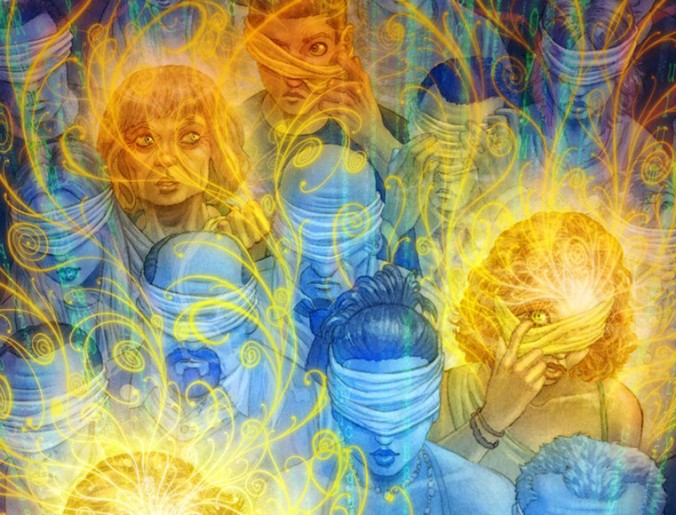
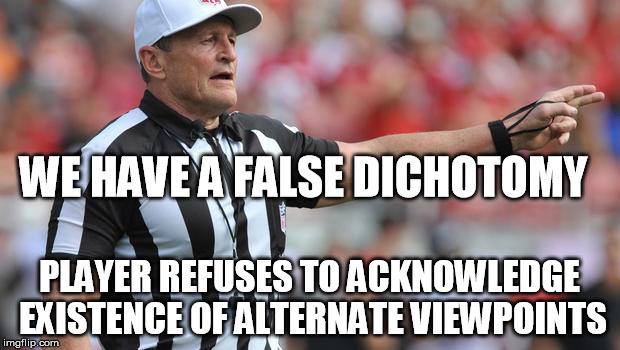
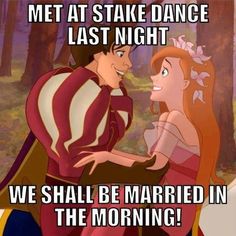
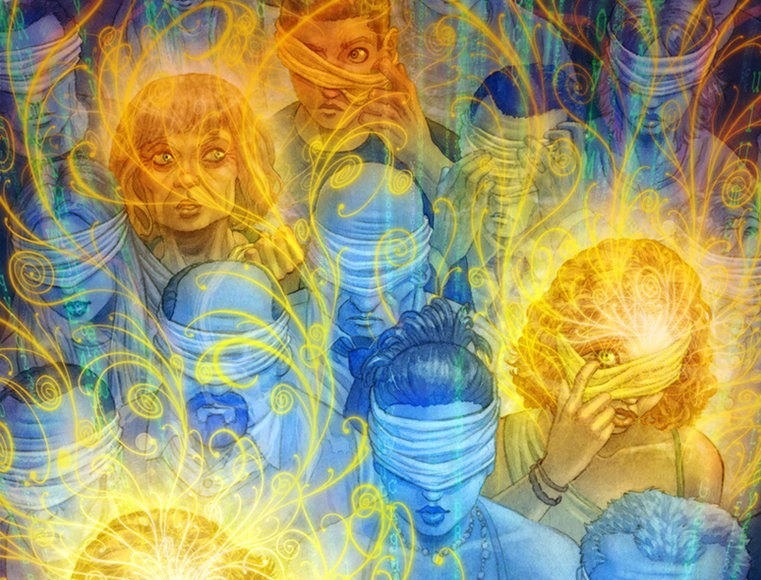
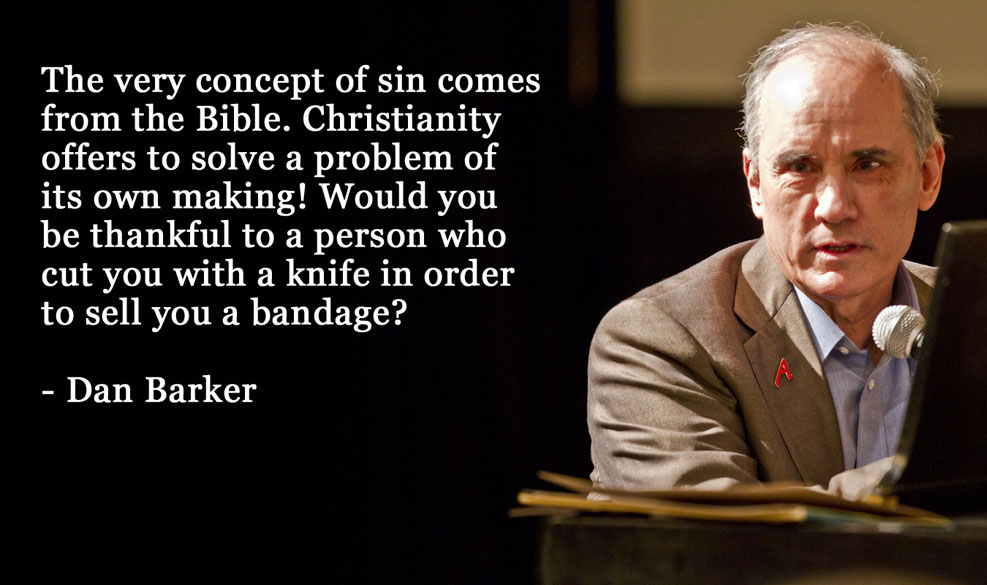

Recent Comments